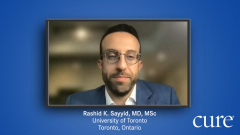
Overview of Castrate-Resistant Prostate Cancer (CRPC)
An expert on prostate cancer gives a brief overview of castrate-resistant prostate cancer.
Episodes in this series

This is a synopsis of an Educated Patient Sound Bites series featuring Alicia Morgans, MD, MPH, of Dana-Farber Cancer Institute; Rashid K. Sayyid, MD, MSc, of the University of Toronto; and Reginald Tucker-Seeley, MA, ScM, ScD, of ZERO Prostate Cancer.
Dr Rashid K. Sayyid defines castrate-resistant prostate cancer as cancer cells continuing to grow despite testosterone suppression below castration levels. He states cells can become resistant to hormone therapy over time.
Castrate resistance is defined as prostate-specific antigen (PSA) increasing 25% over several weeks to an absolute value above 2 ng/mL, along with testosterone levels not being fully suppressed. Dr Sayyid notes castrate-resistant prostate cancer comprises both non-metastatic and metastatic disease, with distinction based on CT and bone scan versus PET imaging.
In summary, Dr Rashid K. Sayyid covers the definition of castrate-resistant prostate cancer, how it develops resistance to hormone therapy, diagnostic criteria involving rising PSA with testosterone not fully suppressed, and how it is categorized into non-metastatic and metastatic disease based on CT, bone scan and PET imaging findings.
*Video synopsis is AI-generated and reviewed by CURE editorial staff.







